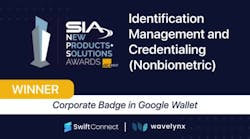Arizona State University is one of the premier metropolitan public research universities in the United States. Enrolling more than 57,000 undergraduate, graduate, and professional students on three campuses in metropolitan Phoenix, including the historic main campus in Tempe, ASU maintains a tradition of academic excellence in core disciplines, and has become an important global center for innovative interdisciplinary teaching and research.
Since 1997, ASU’s identification/access “Sun Card” system provided students with meal plan, debit and door access. Heightened security concerns led ASU to re-examine the university’s campus security requirements and identify a new product to provide state-of-the-art access control technology. The previous system was based on magnetic stripe cards and readers, which were functional but offered limited flexibility to adapt to future technologies such as biometric identification.
The ideal solution would be an advanced contactless smart card that could integrate a multitude of new identification technologies and applications as well as magnetic stripe for use with existing readers on campus. The cards needed to be custom-printed and have a streamlined, sturdy design ensuring the durability of the single-issue card throughout multiple years of constant use during a student’s time on campus.
The university evaluated both proximity and contactless smart card systems for centralized, campus-wide access control for doors, buildings, and departments that could be integrated with other smart card applications. Security integrator Henry Bros. Electronics was selected to implement the system, and it incorporated HID’s iCLASS 13.56 MHz read/write contactless technology.
The new contactless card enables higher security, allowing ASU to use the system software to approve or deny access on any door at any time. Perimeter doors were brought online with iCLASS R10 and R40 mullion-mounted readers. To meet ADA requirements, a reader is tied into a door operator and allows entry after a hard-wired button is pressed and the valid card is presented.
Mutual authentication technology ensures that readers and cards are programmed to communicate prior to the reader sending any signal to the panel. The same authentication will occur any time the card is used for IT security or other on-campus applications. In addition, the technology is more flexible, offering unique time zone and access level setups not previously available. This enables, for example, labs to schedule access levels so that students can gain entrance only at appointed times.
The ASU Sun Card, a 16-bit composite iCLASS contactless card with magnetic stripe, is printed with the students photo along with the ASU logo. A unique 35-bit card format was developed specifically for the university and furnishes more than one million individual card numbers within the assigned format. The assigned numbers are tracked during the manufacturing process to ensure that card numbers are never duplicated.
NFC Pilot Completed
A recent pilot project at the university involved a group of students and staff who accessed a campus residence hall and selected rooms using the iCLASS SE credentials embedded into a variety of popular smartphones. To implement the pilot, HID deployed readers on secured doors to ASU’s Palo Verde Main hall, and HID technology-enabled Sargent Profile Series electromechanical locks from ASSA ABLOY on selected resident room doors.
The mobile access control pilot at ASU was the first to validate the use of digital credentials on NFC smartphones for physical access control on a college campus. To open door locks, participants presented the phones to a door reader just like they do with the Sun Cards. All participants used phones for residence hall access, and some are also used them with a unique additional digital key and PIN to open individual room doors.
“This pilot proved the viability of the NFC-based mobile access model using secure portable credentials and the next generation of advanced access control systems, and also confirmed the high value that staff and students place on using their phones for more and more applications, including opening doors throughout the campus,” says Laura Ploughe, ASU’s director of business applications and fiscal control, University Business Services.
While the pilot was focused on physical access, nearly all participants also expressed an interest in using their smartphone for other campus applications including access to the student recreation center, as well as transit fare payment and meal, ticket and merchandise purchases.




